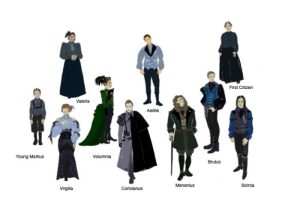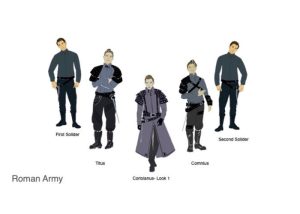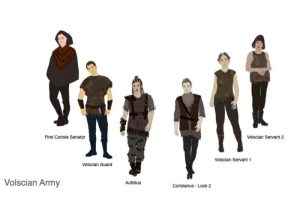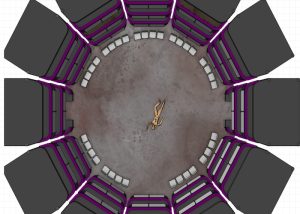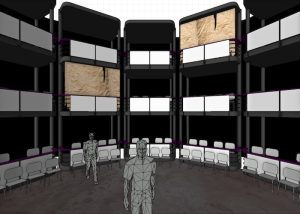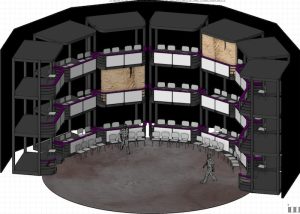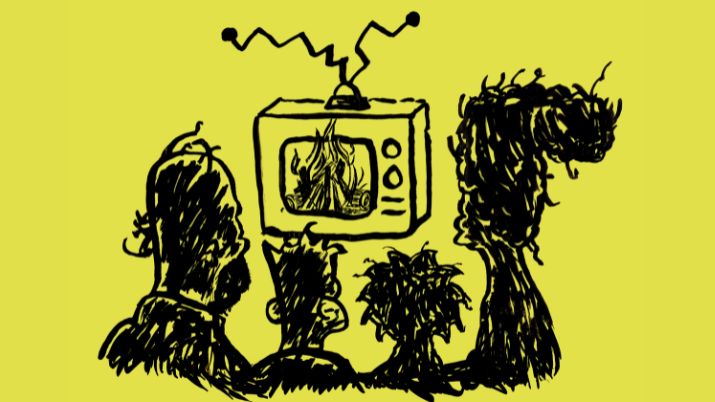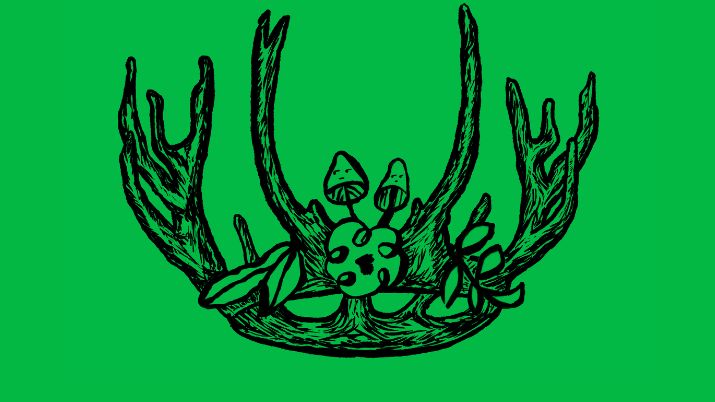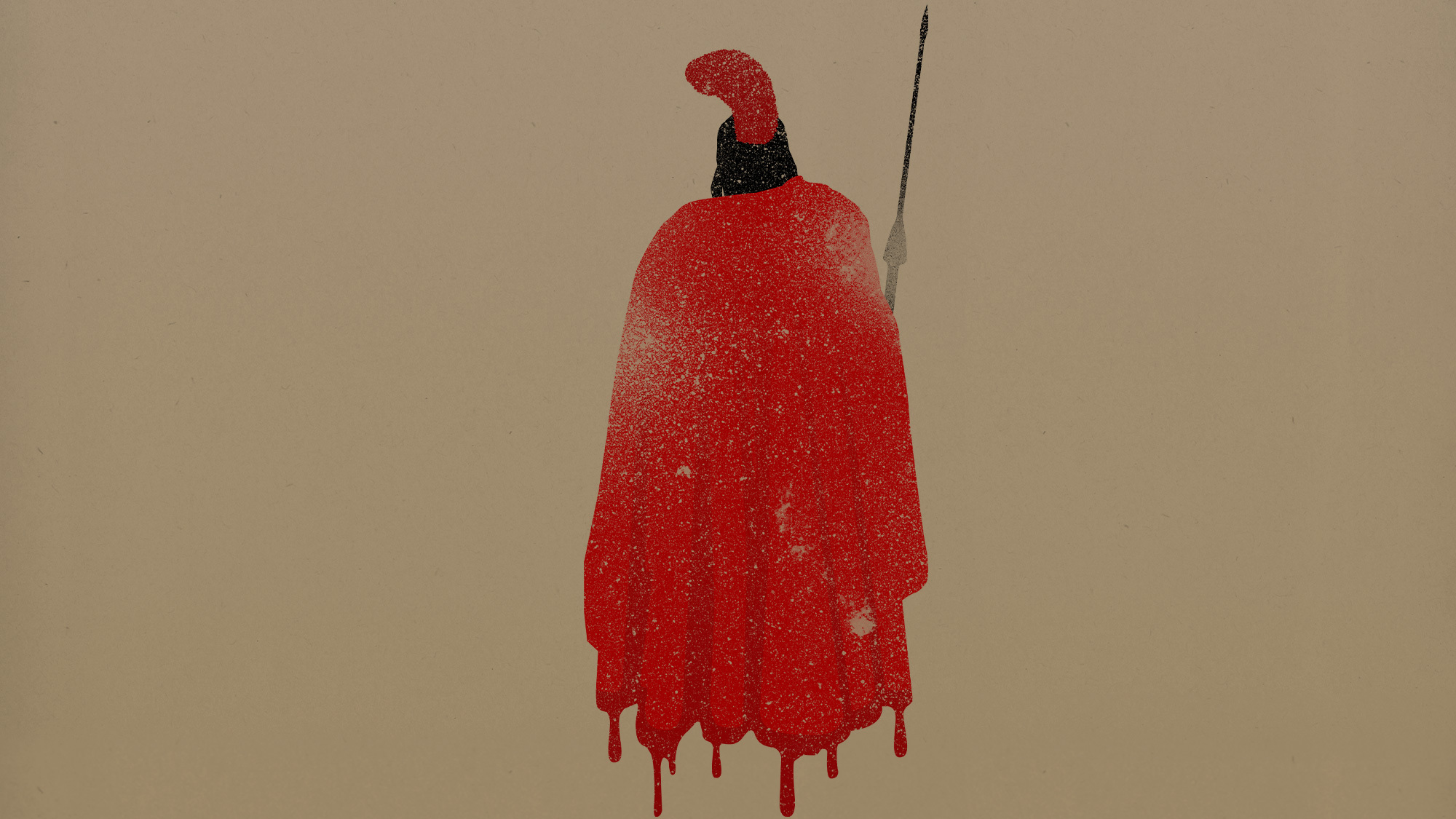

Artwork by Jonathan Wood
Coriolanus
by William Shakespeare
Directed by Tanya Mathivanan
A violent, political tragedy written in the last few years of Shakespeare’s life, Coriolanus explores the tension between military force and popular rule. It follows the downfall of the decorated soldier, Coriolanus, who is banished from Rome due to his disdain of the common people. Enraged, he does the unthinkable and returns to wage war against the very people he had sworn to protect.
Coriolanus is not a play that is often produced. It is Shakespeare’s most political play and has a protagonist that has historically been viewed as unlikeable and problematic. And yet, Coriolanus is my favourite Shakespearean play. I am fascinated by the theme of hypermasculinity and how it plays a destructive role in society. I find the themes of military force in tension with popular rule, civic duty and despair resonant in our contemporary historical moment. I first encountered this play as an undergraduate and fell completely in love with it. It evoked so many thoughts and feelings in me, and three questions in particular have haunted me ever since: What is the role of the military in the toxic hypermasculinity of men? What is the concept of “civility”, when it is rooted in bloodshed, conquering and the colonization of land? What is the teleological function of war and the body of the soldier in relation to society?
What better way, then, to explore the performativity of hypermasculinity and gender roles than with an all-woman/non-binary cast.
The world found in Coriolanus reflects a microcosm of our world. I wanted to explore the social order of this world in order to make sense of all the chaos, violence and lack of compassion in our own. Society trains soldiers to be brutal in combat and specifically grooms them to be violently used against “others”. It then utterly rejects the soldiers when they bring that cultivated brutality back home with them. The role of the soldier is inherently utilitarian, and therefore, the Veteran is rejected when it is unable to transition to another utilitarian role in society. There is also an exploitative and consuming need for “dominant” or colonial societies to conquer for utilitarian purposes such as natural resources, land and the stimulation of the economy. The characters in Coriolanus, to me, are merely products of their own restrictive society, trying to survive in the machine that they are all specific, assigned functional parts of. Blood is the oil that powers this machine.
In order for that mechanism to exist and for power to remain in the hands of the few, rigid class structures, gender roles and military roles have to be imposed on the citizens. Beneath that veneer of enforced civility and order, however, bubbles the blood, guts and brutality of a cannibalistic society. People are nothing but meat sacks to be consumed.
I wanted to create a world that is equally mechanical, aesthetically captivating and nuanced. I settled on Steampunk and Dieselpunk as aesthetic markers.
These genres are “historical adjacent”, and encapsulate past, present and future in one temporal sphere. Victorian Steampunk captures the ideas of industry, expansion, consumption, grandiosity, opulence and the revolution. It ties into the idea of Rome as the Imperial Colonial State that is ever expanding, and a machine that runs on the blood of war. Dieselpunk on the other hand is what I reserved for the Volscians. It is an aesthetic that is all about survival and functionality.
It was vital that I create as immersive an experience as I could. I decided on staging the show in the round, and further utilizing what has classically been seen as the “audience space”. As the audience, what role do we play in the consumption of the violence and oppression that we see on stage? What is our role, therefore, as spectators in the war, the bloodshed, the cruelty, the oppression and the subjugation that take place in the real world? And most importantly, how do we go about changing things?
— Tanya Mathivanan, Director
Credits
Christian Billet Young Martius, Senator
Air Dayman First Citizen, Gentlewoman, Roman Soldier Messenger, Second Volscian Servant, Second Volscian Soldier, Senator
Isabel Hansen Volumnia
Tirion Jones Coriolanus
Sera Jorgensen Third Citizen, First Coriole Senator, Second Roman Soldier, Volscian Citizen, First Volscian Guard, Senator
Isabella Laesecke Brutus
Adriana McKinnon Virgilia
Kristi McQuade Second Citizen, First Roman Soldier, First Volscian Soldier, Aedile, Senator
Gabrielle Nebrida-Pepin Sicinius
Lauren Ordeman Titus Lartius
Robyn Shanks Menenius
Nicole-Anne Smith Cominius
Mai Stone Aufidius
Jasmine White Valeria, First Senator, Fourth Citizen, First Volscian Servant, Third Roman Soldier
Tanya Mathivanan Direction
Lauren McLean Stage Management
Midori O’Connor Asst. Stage Management
Bekah Lazar Asst. Stage Management
Stephanie Barclay Stage Management (Swing)
Kelsey PetersonHead Scenic Artist
Anjali Mandapaka Scenic Design
Roohi Kamal Scenic Design
Jennifer Stewart Scenic Design Guide
Chloe Bohonos Asst. Scenic Design
Charlotte Chang Costume Design
Chloe Earle Asst. Costume Design
Zac Labrie Lighting Design and Sound Design
Ben Paul Asst. Lighting Design
Amy Currie Lighting Operator
Cat Main Asst. Production Management and Sound (QLab Programming)
Christopher Ross-Ewart Music Composition
Jamie Son Sound (SFX Creation)
Kai Wong Sound (In-House Composition and Editing)
Joy Cheng Sound Operator
Mike Kovac Fight Direction
Sylvie La Riviere Fight Direction
Phay Moores Intimacy Direction
Sam Jeffery Intimacy Direction
Stephanie Barclay, Isabelle Barlow, Kaileigh Funnell, Midori O’Connor, Kelsey Raeanna, Jamie Ragins, Cheyane See, Betsy Sun, Kristine Wu, Hannah Abbott, Samantha Cheng, David Moise, Ben Paul, Olivia Chen, Sophie Fougere, Crystal Luo, Tariro Motsi, Nixita Taneja, Grycel Tercero, Chloe Bohonos, Roohi Kamal, Emily Cheng, Matthias Kammüller, Zac Labrie, Shaliya Ma, Lauren McLean, Grace Nguyen, SuYeon Park, Yun Shim, Elyse Wall, Bekah Lazar, Taylor Wen Jingyi Cheng, Yena Lee, Hallie-Ahn Duncan, Nyssa Estrella, Zoe Lin, Huda Shawwash, Kai Wong, Brendan Lowe, Taylor Wen, Amy Currie, Jane Kim, Muleba Chailunga
Celeste Mol, Caroline Tang, Hannah Abbott, Roohi Kamal
Stephen Heatley Department Head
Jacqueline Firkins Costume
Robert Gardiner Lighting
Leora Morris Direction
Patrick Pennefather Sound
Brad Powers Technical Production
Patrick Rizzotti Scenic
Lorraine West Scenic Paint
Collette Berg Stage Management
Amber Barton Movement Coach
Sheila Langston Voice and Speech Coach
Borja Brown Production Management
Cam Cronin Department Administrator
Ian Patton Academic Administrator
Lynn Burton Head of Properties
Jodi Jacyk Head of Wardrobe
Ryan Murcar Staff Technical Direction (Scenic)
Erika Champion Staff Technical Direction (Lights and Sound)
Tony Koelwyn Audience Services Manager
Andrea Cheng Communications Specialist
Jiejun Wu Marketing and Communications Assistant
Karen Tong Theatre and Film Studies Graduate Secretary
Sarah Crauder Film Program Administrator
Dmitri Lennikov Film Collections Coordinator
Stuart McFarlane Film Equipment Manager
Kirsten Dougans Assistant to the Head
Design Portfolio
Schedule
Performances
March 30–April 2, 2022
Wednesday, Thursday, and Saturday performances will start at 7:30 PM. The Friday performance will start at 7:00 PM.
Student Talk Back
Friday, April 1
After the show
Location
TELUS Studio at the Chan Centre
6265 Crescent Rd, Vancouver, BC V6T 1Z1
We acknowledge that the UBC Vancouver campus is situated within the traditional, ancestral and unceded territory of the Musqueam.
For any questions, please contact our box office: 604.822.6835 or box.office@ubc.ca.
